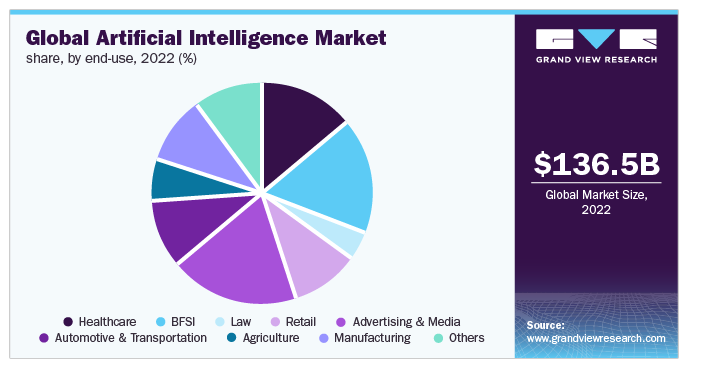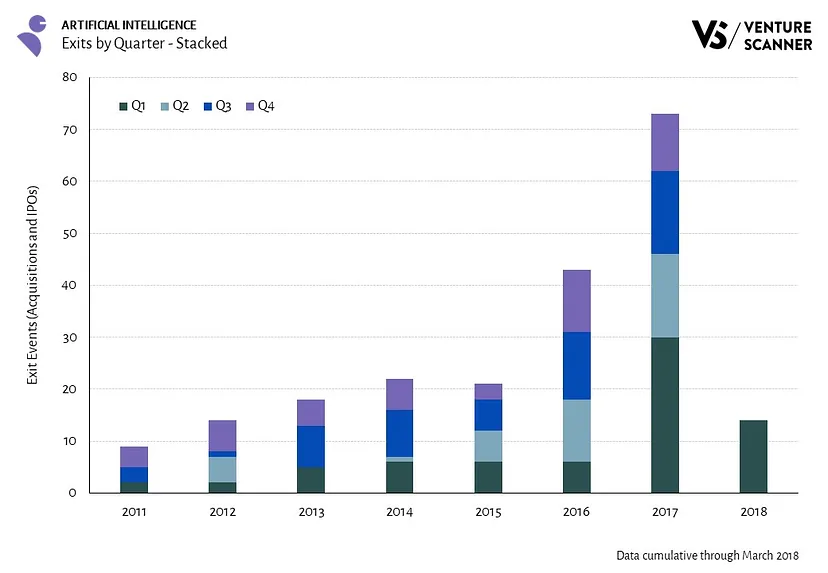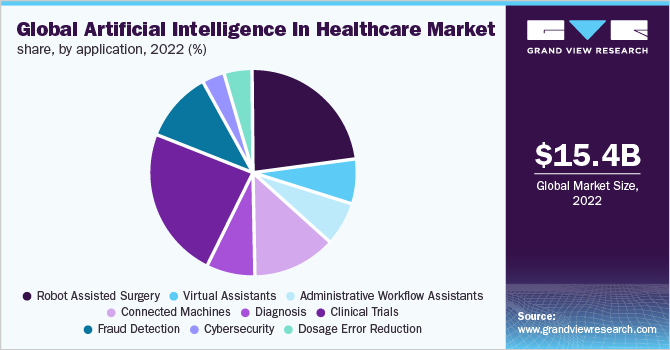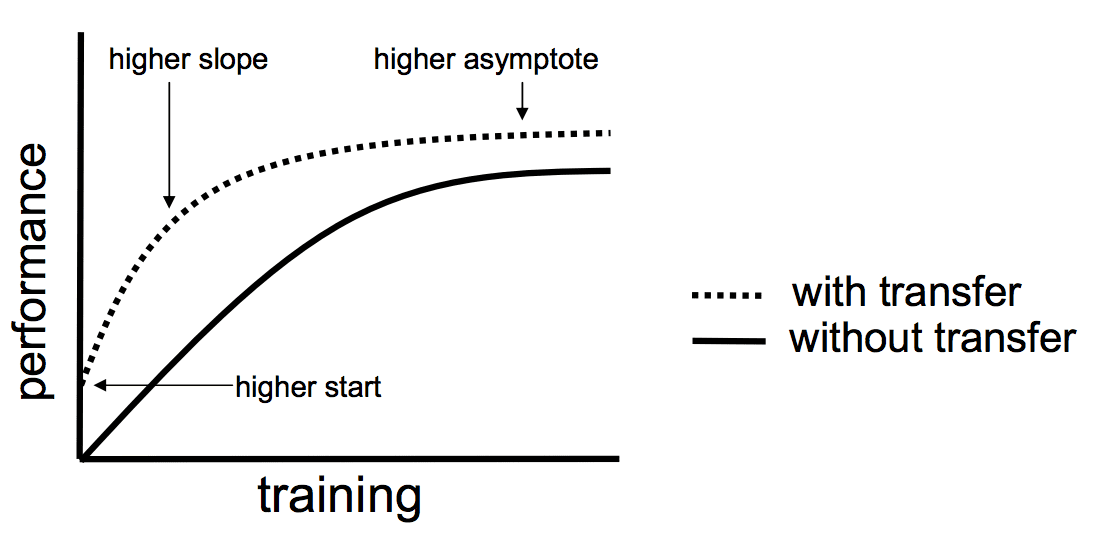Moonpreneur
Update: This article was last updated on 19th September 2023 to reflect the accuracy and up-to-date information on the page.
Do you know how much the artificial intelligence (AI) sector is worth? GrandViewResearch estimates that the global AI market is presently worth $136.6 billion and will increase to $1.81 trillion by 2030.
New AI technologies are introduced daily. The entrepreneurs and inventors are doing all possible to get the most out of the technology.

Source: Grand View Research
Analyzing data is the most effective technique to comprehend the development of AI. So, before moving ahead, let’s take a look at the statistics first!!
- The market for artificial intelligence or (AI) software is anticipated to generate 126 billion dollars in revenue by 2025, according to Statista.
- 37% of businesses have adopted AI in some capacity, according to Gartner. Over the last four years, the proportion of businesses using AI increased by 270%.
- Servion Global Solutions predicts that by 2025, AI will be used in 95% of consumer interactions.
- The market for AI software is anticipated to increase by over 54% year until 2020, according to a Statista analysis, and will reach a forecasted value of USD $22.6 billion.
The interesting information from the field is rapidly evolving and transforming many industries and impacting our lives. So, we at Moonpreneur have listed 10 significant developments in the field of AI.
| Sr. No | Latest Developments in AI |
| 1. | GPT-3 |
| 2. | Computer Vision |
| 3. | AI in Healthcare |
| 4. | Reinforcement Learning |
| 5. | Explainable AI |
| 6. | Transfer Learning |
| 7. | AI-assisted creativity |
| 8. | Virtual agent |
| 9. | Biometrics |
| 10. | AI-optimized hardware |
1. GPT-3
GPT-3, developed by OpenAI, is a cutting-edge language model with 175 billion parameters. It has revolutionized the creative space as one of the most advanced AI language models.

GPT-3 Features
- GPT-3 performs Natural Language Processing (NLP) tasks like translation, summarization, and question-answering across multiple languages.
- It leverages deep neural networks to generate text that mimics human speech and provides contextually appropriate responses.
- However, there are concerns about potential biases and inaccuracies in the output due to the extensive training data used.
2. Computer Vision
Computer vision, a branch of AI, enables computers to analyze digital images and classify objects, individuals, and actions. Recent advancements in this domain have empowered robots to achieve human-level performance in tasks like object detection and emotion recognition.

Features of Computer Vision:
- Convolutional Neural Networks (CNNs) are a significant breakthrough in deep learning, specifically designed for visual data processing.
- Computer vision finds potential applications in manufacturing, retail, and entertainment industries.
- It also plays a crucial role in augmented and virtual reality, enabling the creation of immersive virtual worlds that respond to user gestures.
- As computer vision continues to advance, robots will become even more proficient in interpreting visual data.
Recommended Reading: TOP AI NEWS OF 2023
3. AI in Healthcare
AI plays a critical role in personalized medicine. It assists in designing a patient’s treatment plans based on their health history and genetic makeup.

AI has significantly improved medical imaging algorithms, surpassing human capabilities in diagnosing diseases from X-rays, MRIs, and CT scans. This advancement enables earlier and more effective treatments.
Features of AI in Healthcare:
- The integration of AI in healthcare has the potential to revolutionize patient monitoring, reduce healthcare expenses, and enhance medical efficiency.
- Furthermore, AI is employed in the development of new medications and predicting optimal patient response to specific therapies, leading to improved treatment outcomes and cost reductions.
To ensure responsible and transparent implementation, ethical considerations such as data privacy and algorithmic bias must be carefully addressed.
4. Reinforcement Learning
Reinforcement learning is a training method that uses rewards or punishments to teach AI agents, enabling the development of self-driving vehicles and other autonomous systems.
Key Features of Reinforcement Learning:
- Agent: The agent interacts with its environment and makes decisions.
- Environment: The environment represents the external world beyond the agent’s control.
- Reward Signal: The agent receives feedback through reward signals to learn and improve its actions.
Reinforcement learning finds practical applications in teaching virtual assistants to communicate effectively and enabling autonomous robots to navigate autonomously.
5. Explainable AI
One of the primary challenges in AI is the “black box” problem, where algorithms produce accurate predictions but lack transparency in their decision-making process. Explainable AI (XAI) aims to address this issue by creating AI systems that are both precise and understandable.
Key Features of Explainable AI:
- Accuracy and Transparency: XAI focuses on developing AI systems that can explain their predictions or judgments in a way that humans can comprehend.
- Interpretable Models and Post-hoc Justifications: Techniques such as interpretable models and post-hoc justifications are used to create understandable AI systems.
Illustrations, Narratives, and User Interfaces: Explanations may be provided through visualizations, narratives in everyday language, or interactive user interfaces, allowing users to explore how the AI system makes decisions.
6. Transfer Learning
Transfer learning is another important concept in AI, involving the utilization of knowledge gained from one domain to solve related problems in another domain more effectively.
Features of Transfer Learning:
- Domain Adaptation: Transfer learning enables the application of knowledge gained from addressing one problem to effectively tackle a different but related problem.
- Domains and Applications: Transfer learning has been successfully employed in various domains, including computer vision, natural language processing, and audio analysis.
- Efficient Use of Resources: It allows the efficient and effective utilization of pre-existing models and resources to address new problems.
Overall, both Explainable AI and Transfer Learning play significant roles in advancing AI’s transparency, understandability, and problem-solving capabilities.
7. AI-assisted creativity
The advent of AI has brought about significant changes in various aspects of our lives, including its impact on the creative process. The field of AI-assisted creativity is rapidly expanding, offering immense potential for transforming the creative landscape.
Features Of AI- assisted creativity:
- Integration of Technology: As technology continues to advance, it will play an increasingly integrated role in the creative process.
- Consideration of Consequences: It is crucial to carefully consider the potential consequences of AI-assisted creativity and ensure responsible and appropriate application.
- Tasks in AI-Assisted Creativity: AI models are capable of generating artwork, music, and writing, among other creative tasks.
- Mimicking Artistic Styles: AI models have demonstrated the ability to mimic artistic styles, allowing for the creation of artwork that resembles the work of famous artists.
- Composing Music: AI models can also compose music, producing original compositions that captivate listeners.
- Co-Authoring Scientific Papers: In addition, AI models have shown the capability to co-author scientific papers, aiding researchers in their work.
Overall, AI-assisted creativity opens up new possibilities for artistic expression and collaboration, but careful consideration and responsible implementation are necessary to harness its potential effectively.\
8. Virtual agents
A virtual agent, also known as an intelligent virtual agent, virtual representative, or chatbot, is a computer application designed to interact with people. These software programs primarily rely on pre-written rules, often used in customer service, to provide responses to queries.
Key Features of Virtual Agents:
- Instructional Design Tools: Virtual agents have evolved into valuable tools for instructional design, aiding in the delivery of educational content and support.
- Chatbots and Conversational Agents: Chatbots, also referred to as conversational agents, are utilized in web and mobile applications. They serve as customer service representatives, conversing with humans and addressing their inquiries.
- Wide Range of Functions: Virtual agents are capable of answering various questions, providing information, making recommendations, and even performing tasks on behalf of the user.
Virtual agents offer convenient and interactive ways for users to obtain information and support, making them increasingly valuable in various domains.
9. Biometrics
Biometrics is the measurement of biological or behavioral features used to identify individuals. Many of these traits are inherited and cannot be easily predicted or stolen.

Features Of Biometrics:
- Enhancing Daily Security with Biometric Identity: Biometric identity is increasingly vital for strengthening daily security measures. Unique biometric traits offer an alternative to traditional password systems for computers, phones, and restricted access areas.
- Biometric Authentication in Workplaces and Consumer Identification: Biometric authentication methods, such as fingerprint, facial, and iris scans, are employed to verify the identity of personnel at workplaces and to comply with KYC (Know Your Customer) and KYB (Know Your Buyer) regulations for consumer identification.
- Robust Biometric Authentication Solution: When combined with biometric authentication data, it provides a robust authentication solution, making it more challenging for fraudsters to deceive the system.
10. AI-optimized hardware
AI-optimized hardware refers to specialized hardware architectures or components built and optimized to accelerate AI and machine learning (ML) applications. Graphics processing units (GPUs) and Tensor Processing Units (TPUs) (Google’s AI accelerators) are examples of such hardware.
Features Of AI optimized hardware:
- AI-optimized hardware often relies on the processing power of standard CPUs to enhance its performance.
- The commercial world has a high demand for AI software, leading to a growing market for supporting hardware.
- To enhance the capabilities of AI algorithms, businesses are developing new hardware products like GPUs and Google’s TPUs.
- These processors can accelerate AI algorithms and yield substantial improvements in outcomes.
In conclusion, the realm of AI is vast and ever-expanding, fundamentally transforming how we live and work. The examples discussed here merely scratch the surface of its potential. To navigate this dynamic landscape successfully, it is essential to stay updated on the latest advancements. By remaining informed about AI breakthroughs, we can make informed decisions and effectively shape our future course of action.
Moonpreneur is on a mission to disrupt traditional education and future-proof the next generation with holistic learning solutions. Its Innovator Program is building tomorrow’s workforce by training students in AI/ML, Robotics, Coding, IoT, and Apps, enabling entrepreneurship through experiential learning.


















I am a practicing nurse and this blog provided an efficient overview of the latest developments in AI and their impact on different industries, along with the potential benefits and concerns associated with each advancement. But can you please specify the importance of AI in healthcare?
Hello, Dr. Halley it looks like you are a doctorate and AI will definitely help you in your profession. AI has the potential to revolutionize healthcare by improving diagnosis accuracy, optimizing treatment plans, reducing medical errors, and enabling personalized medicine. It can also analyze large amounts of data and improve research and drug development.
This is kind of an introduction to AI. It would be helpful to see more specific examples of how AI is impacting each of the mentioned economic sectors, as well as more in-depth analysis of the potential ethical implications of AI.
I recently read about Generative Adversarial Networks. They consist of two neural networks competing against each other, with one network generating new data and the other network trying to discriminate between real and generated data. From image generation to Clothing Translation, it has several real-life world applications. Seems this new concept will change the AI world forever.
What is the current status of artificial intelligence?
AI is advancing towards Theory of Mind, where machines exhibit human-like decision-making, leading to the perception of having a mind.
AI is bullshit. It is doing things which is making today’s generation less creative and more dependent on technology.
AI advancements are fine but we can’t ignore its negative impact on employment and job displacement.
Do you think one day, AI would completely take over human jobs?
Although AI has been a very helpful human partner, but Regardless of how well AI machines are programmed to respond to humans, it is unlikely that humans will ever develop such a strong emotional connection with these machines. So I don’t think AI can replace humans, especially as connecting with others is vital for business growth.
U have missed to mention Cybersecurity and Quantum AI
Is Alexa an AI device?
In recent years, we’ve frequently discussed the current era as a golden age of artificial intelligence (AI). Concepts that once seemed like science fiction have become a reality, and Alexa is a prime illustration of this.